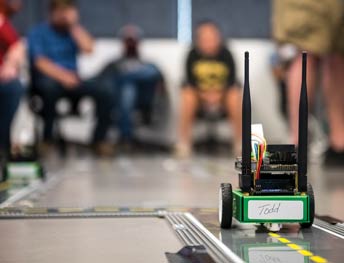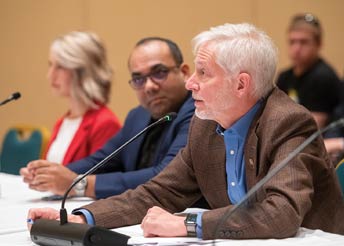
Contact Us
Institutional Communications
Bureau of Mines Building, Room 137
Laramie, WY 82071
Phone: (307) 766-2929
Email: cbaldwin@uwyo.edu
Computing for the Future
Published January 24, 2022

Computer science junior Teaghen Sweckard studies on a laptop outside of Old Main.
She is excited about the new School of Computing and believes it will attract more
students and offer a broad range of skills that aren’t necessarily the focus of a
traditional computer science program.
The new School of Computing aims to prepare students, propel research and foster workforce development.
By Micaela Myers
Computing and technology touch every part of our lives, enable data-driven decisions and—as part of every industry—form a cornerstone of economic growth. All students need a strong computational foundation to thrive in today’s workforce. Given these facts, in January, the University of Wyoming Board of Trustees approved a plan for a School of Computing. Initially, the school will be housed within the College of Engineering and Applied Science. Eventually, the School of Computing will become a separate unit.
“The School of Computing will provide the organizational infrastructure and emphasis to accelerate the growth and impact of computing, artificial intelligence and data science at UW across research, learning, entrepreneurship and engagement,” UW President Ed Seidel says. “The School of Computing will differ from other departments in science or engineering, in that it will be pervasive across the university; it will be interdisciplinary; it will increase external funding; and it requires collaboration at the college or school level. This novel organizational structure will ensure that computing and digital literacy become pervasive across all disciplines at UW.”
Students First
The school hopes to begin offering a bachelor’s degree programs in the 2024-25 school year, including 2-plus-2 agreements with the community colleges. Eventually, undergraduates will be able to choose from multiple tracks plus minors. These will be available to many majors across UW, with plans to develop graduate degrees in the future.
The school will also work to infuse computing skills across the university to produce tech-savvy graduates ready to fill and create jobs in a changing Wyoming economy.
“Computing is essential in all aspects of modern society, like teamwork and communication skills,” says Lars Kotthoff, an assistant professor of computer science. “Unlike the latter, computing is not usually emphasized in educational contexts, with the expectation that students acquire computing skills largely on their own. The School of Computing will propel computing to first-class citizenship at UW and infuse it in curricula throughout the university. Strengthening computing and computer science is a crucial step to strengthen UW’s position nationally and internationally.”
Computer science junior Teaghen Sweckard of Buffalo, Wyo., is excited about the School of Computing and believes it will attract more students and offer a broad range of skills that aren’t necessarily the focus of a traditional computer science program.
“This new school will benefit students by providing them with the computing skills necessary for the workforce that they are facing after college,” Sweckard says. “They will be more prepared with applicable skills from the School of Computing and will have a better idea of what they are interested in, as the school is interdisciplinary and provides students the opportunity to get a sense of what is available after college. The new school will also benefit the state because students doing research and entrepreneurship in computing will bring solutions to problematic economic situations locally and will lead to job opportunities and students, ultimately, staying in Wyoming.”
In high school, Sweckard thought she’d pursue biomedical engineering. A related project forced her to learn to code.
“After learning to code a little bit on my own, I realized that I liked that a lot more than anything else I was doing with the project,” she says.
Sweckard took all the computer classes she could in high school and completed two related internships, one at Gannett Peak Technical Services and another at Kennon Products. While studying at UW, she began working on the software team at Trihydro, an engineering and environmental consulting firm.
“I enjoy programming a lot, and I think applying that to projects that make a difference and are meaningful in some way sounds pretty great to me,” she says.
“The School of Computing is fundamentally about students,” says Professor Gabrielle Allen, UW’s special assistant for strategic initiatives for the Office of Research
and Economic Development. “Across every discipline and every major, employers are looking for students who know how to use computers and data and how to apply that knowledge in novel and interesting ways.”
Students will also learn how to approach problems, utilize software options and work on interdisciplinary teams, Allen says.

Wyoming teachers participate in a robot and coding demonstration in UW’s Engineering
Education and Research Building during the Machine Learning for High School Teachers
weeklong professional development training.
Similar to the research scholar programs in science and engineering, future students in the School of Computing will be able to apply to become computing scholars, earning money toward their education along with hands-on research opportunities. Also in the works is an internship program in which students will work on interdisciplinary teams with Wyoming companies.
“We want this to be an environment where students can take ideas and run with them,” Allen says. “They are really going to come up with new innovations.”
Organizers of the school want to reach students early and often—long before they enter UW.
“Outreach is a primary goal,” says mathematics and statistics Professor Bryan Shader. Shader, along with Vice President for Information Technology Robert Aylward, guided a team of 30-plus faculty, staff and students to create a draft plan for the School of Computing. “We need to work with the Wyoming Department of Education, K–12 teachers and administrations throughout Wyoming, and our community colleges to create this pipeline and get people to think more broadly about what computing is.”
The School of Computing is not seeking to replace the soon-to-be-combined Departments of Computer Science and Electrical and Computer Engineering—which perform important teaching and research—but rather to supplement them to extend the reach of digital literacy throughout all disciplines on campus and to everyone in the state. Its reach aims to be much broader and comprehensive.
“Because of that, it should be more attractive to a broader population,” Shader says.
From day one, Allen and Shader hope to attract diversity in faculty, students and the disciplines that join and partner with the school.
Research Forward
“Presently at UW, research on computing and the use of computing for research are being undertaken in various departments across campus,” says electrical and computer engineering George J. Nicholson Professor Suresh Muknahallipatna, the liaison to the National Center for Atmospheric Research (NCAR)-Wyoming Supercomputing Center in Cheyenne. “Because computational research is interdisciplinary, a single entity such as the School of Computing will enhance collaboration among computational research faculty in various departments. Faculty using computation for their research will have a resource in the computing school to help them develop computational models.”
Shader says UW and the state have invested a great deal in high-performance computing, and the School of Computing will move that investment—and related research—to a higher level.
NCAR operates the NCAR-Wyoming Supercomputing Center. NCAR Associate Director and Director of the Computational and Information Systems Lab Anke Kamrath says that the center has become a vibrant hub for collaboration between NCAR and UW.
Kamrath says, “The School of Computing will further strengthen the partnership around all things computing—including collaborative proposals and projects, innovative technology collaborations, educational and internship opportunities for students and, ultimately, through the strengthening of the future workforce across the state of Wyoming. We are excited to be a part of this increasing focus on computing at UW.”
The school will also help UW become more competitive for national research grants that enable research and educational opportunities for students. Federal research agencies such as the National Science Foundation increasingly focus existing research funding towards areas that are advanced by computational approaches, and Congress is working on providing significant increases in funding to NSF, the Department of Energy, and other research agencies in these areas.
“I think the school will really help us provide that bridge between new tech and computer science and bring the varied expertise we have on campus to bear on problems of regional and national importance, and significantly increase our capacity to bring external funds to UW to support our students and faculty,” Allen says. “It will also place us in a better position to bring in more corporate partners to provide our students with the real-world experience they need.”
A planned Wyoming Data Hub will serve UW and the state, drawing upon research data already collected by a variety of sources on and off campus. The hub will allow students and faculty to develop, evaluate and use new computational and analytical tools to mine and synthesize data. It will also make Wyoming-centric data more accessible to Wyoming citizens and state agencies while facilitating interdisciplinary research and addressing critical Wyoming issues and opportunities.
Researchers from a variety of disciplines and across Wyoming can partner with the School of Computing for computational expertise. Together, they can share ideas, offer tools, develop new algorithms and address real-world problems.

At the Wyoming Blockchain Stampede in September, UW President Ed Seidel and National
Science Foundation Director Sethuraman Panchanathan participate in the Future Forward
discussion.
A Skilled Workforce
“Data science, analytics and artificial intelligence aren’t just the way of the future—they are the way of now,” say Jerad Stack and Angie Schrader, co-founders of Flowstate in Casper, Wyo. Collaborating with major national players in the pipeline industry, Flowstate leverages the predictive and proactive capabilities of big data and artificial intelligence
to develop a new standard for leak detection systems. “Every industry is being driven forward by digital transformations and technologies developed to utilize data. For example, we see on a daily basis how data is being used in the oil and gas industry to drive decisions and increase safety.
“We are excited that the university sees this and is working to provide education and resources in this area,” they continue. “Students across campus will need to be equipped with skills to not only navigate this data-driven world but also to help drive it forward. Computing and data science are no longer just the realm of engineers and scientists—it impacts every industry across Wyoming, and we are optimistic that businesses across the state will benefit from the resources provided through the school.”
Training students for high-tech jobs in companies such as Flowstate gives them a path to stay in Wyoming and can attract new businesses via a skilled workforce.
“In all sectors—agriculture, energy, tourism—computing skills are critical, whether it’s navigating user interfaces or utilizing new tools,” Allen says. “It’s critically important for economic development.”
Shader adds, “We’re already getting lots of contacts from companies in Wyoming who are demanding students with the types of skillsets we can bring out.”
Imagine, he says, if every state agency and company in Wyoming had a trained employee with the gumption and ability to say, “Can we do this differently or better or more efficiently?”
“I think if we can get our trained students out into the state, they’re going to be agents of change,” he says.
The school also wants to help expand training for those already in the workforce and those needing to switch careers.
Seidel says, “Our aim is to provide our students with the expertise and experiences they need to have successful careers; play a central role in creating the workforce, knowledge and infrastructure to support Wyoming companies; and empower data and computational research driven by applications of Wyoming interest.”
Contact Us
Institutional Communications
Bureau of Mines Building, Room 137
Laramie, WY 82071
Phone: (307) 766-2929
Email: cbaldwin@uwyo.edu


